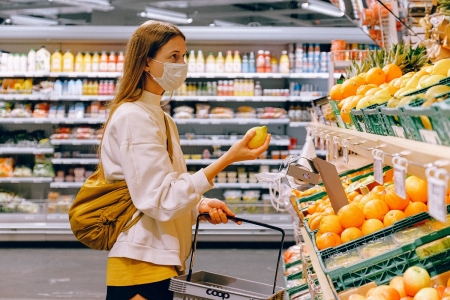NCFIL Executive Director’s Perspective: August 2020

NCFIL Status
Equipment installation, training and commissioning advance the NC Food Innovation Lab toward full operational status. Several staff trained for a week on our AllPax retort, and several equipment pieces were commissioned and pressed into service, including the blancher, freeze dryer, dehydration cabinet, bladder presses, juicers and extractor/finisher.
We will install our pasteurizer/sterilizer in the coming weeks, and we are preparing for training to commission this piece of equipment. Our fluid bed dryer also arrived earlier in the month and will be operational shortly. COVID-19 still plagues us with securing trainers to come into our facility for face-to-face hands-on training.
Several more companies have requested statements of work, and we have signed more contracts with North Carolina startup companies. We also earned a contract on a National Institutes of Health grant to manufacture samples for a clinical study. Several companies are anxious to tour our facility and work with NCFIL, but due to COVID-19, we continue to limit outsiders into the facility until North Carolina moves into Phase 3.
Dynamic Changes in the Food Industry
This month’s perspective visits the dynamic changes occurring in the food industry as it grapples with COVID-19, specifically what changes we’ve heard about and their impact on the industry after a vaccine is identified or the coronavirus threat abates.
Consumer Behaviors
- Consumers continue to stock up on items when they go grocery shopping in person. Healthier, more nutritious foods seem to be a continued focus. However, consumers also continue to purchase more frozen foods, snacks, and ice cream as comfort foods. Premium chocolate sales have increased 12.5%, while overall confectionery has seen a 3.8% increase in sales.
- Consumers are not only spending less money on groceries, but they also get less products in their carts due to increased food prices and unemployment amongst some consumers.
- Farmers Markets and roadside produce stands have seen a 20% growth this summer as consumers increased fruit and vegetable consumption. The consumer also feels safer in these smaller establishments, many of which are outdoors, than larger retail outlets.
- The pandemic has created food poverty for some families, especially in rural areas. School-age children continue to have limited access to government school lunch programs. Rising unemployment and rapidly increasing food prices along with spot shortages of some products contribute to food insecurity. Food banks are reporting 70% higher requests for assistance than last year.
Supply Chain
- Transportation routing continues to be a challenge as retailers and food service start to ramp back into operation. This is especially evident in perishable foods.
- Continued shortages of packaging supplies impact plastic bottles, caps and other closures as well as sprayer units. Several disinfectant and sanitizer manufacturers pivoted their manufacturing lines to bulk packaging and now encourage users to refill previously purchased bottles.
- The meat industry is gradually recovering, but due to increased social distancing and the continuance of sick employees in their plants, the return to normal production capability and capacity is slow.
- Consumers still purchase plant-based meats to feed their families, but at a somewhat slower pace than earlier in the pandemic. Plant-based meat volumes peaked at 45% above last year’s sales during late spring and early summer, but have returned to 20% increases during the last few months.
Labor and Operations
- Harvest is now occurring in many states including North Carolina. Labor shortages, social distancing, and transportation to deliver labor to harvest sites hinder the front-end of food processing. Once products reach the food processing facilities, they are rapidly processed as manufacturing capacity in the plants is highly automated.
- Due to social distancing and inability to travel, employee training has been curtailed. Virtual courses try to fill the gaps, but often, they are poor substitutes for in-person training.
- Seeking to increase plant efficiency and food safety, food processors are changing their shop floors by moving away from Windows-based applications and hand-held devices to more IOS and Android applications using cloud technologies.
- Internet outages have challenged some food processors in recent months. The problem stems from so many employees working remotely that it taxes the infrastructure. Unlike power outages, which can be mitigated with back-up generators, internet outages can shut down a processing line and disrupt operations.
Corporate Changes
- Many food manufacturers and retail outlets are improving their direct-to-consumer (DTC) capability to make it easier for consumers to shop online for essentials. Upcoming rounds of technological improvements will personalize customer service and make systems less cumbersome.
- Beyond Meat launched a DTC website for their plant-based meats. Will others follow? The pandemic challenges the plant-based foods industry because few have a DTC website, and the majority of products are in the early stages of consumer acceptance while they shop in retail outlets. Investors continue to reward plant-based meat companies. Several of them have received increased funding in recent months to sustain growth.
- The U.S. Food and Drug Administration and the Occupational Safety and Health Administration recently released a guidance document for food manufacturers. This extensive checklist covers actions to consider to keep employees safe from the coronavirus. We look for many of these recommendations to become codified after a vaccine is approved.
Final Thoughts
Thank you for reading this month’s perspective. These are the views and opinions of the NCFIL Executive Director and may not reflect the opinion of others at NC State University. We welcome your feedback and perspectives.
Plant-based food innovation is a very active area in the food industry, so let’s talk about how NCFIL can collaborate with you, using jobs-to-be-done theory and design thinking for new ideas. We can help you bring ideas to market!
- Categories: